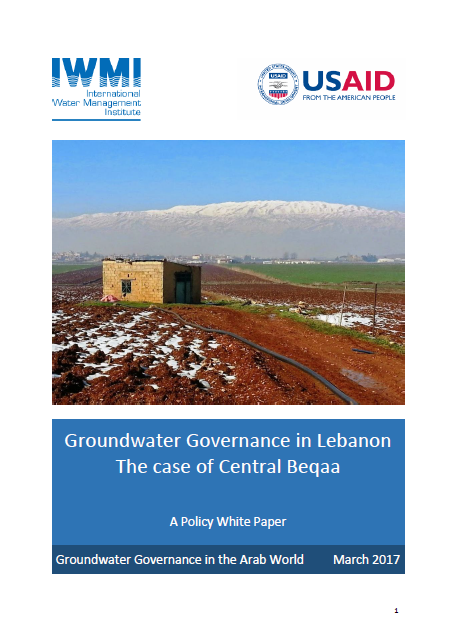Groundwater Governance in Lebanon_ The case of Central Beqaa
 |
A Policy White Paper
outil d'aide à la décision Mar 2017 ; 36 pages
Aut. François Molle & Marie-Hélène Nassif & Safaa Baydoun &
Ed. IWMI - Giza USAID - Antelias
Téléchargeable sous format: PdF
Téléchargeable chez l'éditeur
Abstract:
This policy white paper is part of a project on "Groundwater Governance in the Arab World" funded by USAID. It provides a review of groundwater management and policy options in the world, with a focus on the MENA region, as well as case studies of Tunisia (Haouaria region), Jordan (Azraq groundwater basin) and Lebanon (Central Beqaa). Each country case study has been the subject of two scientific reports: a study of the groundwater policy background and history; and a report on field investigations in each basin carried out to document current dynamics and problems of groundwater-based agriculture.
This White Paper is meant to tease out important points from all these research output in order to provide policy ideas and orientations in a summary form. Analyses and recommendations stem from the ideas advanced by stakeholders during the workshops held, but also from field work and from the evidence synthesized from experience at the world level by this project. The control and regulation of groundwater abstraction is perhaps the most vexing challenge of water management worldwide, with very few encouraging or 'success stories'. Mindful of the political complexities of groundwater regulation, this White Paper is an attempt to contribute to groundwater policy thinking in Lebanon. Contents:
1 Introduction
2 Background on Groundwater Governance in Lebanon
2.1 Groundwater Resources and Use
2.2 Legal and Regulatory Framework
3 Groundwater Use in the Central Beqaa
3.1 Available Water Resources
3.2 Agricultural and Domestic Use of Groundwater in the Central Beqaa
3.3 Groundwater Management in the Beqaa
4 Assessing Governance Options in the Face of Current Dynamics
4.1 Examining Current Practices against International Experience
4.1.1 Institutional setting
4.1.2 Licensing criteria
4.1.3 Licensing process
4.1.4 Handling of illegal well drilling or use
4.1.5 Water rights
4.1.6 Safeguard or prohibition zones
4.1.7 Planning process
4.1.8 Monitoring and technical capacity
4.1.9 Information flows
4.2 Policy Opportunities and Constraints
4.2.1 Registering wells and monitoring their use
4.2.2 Institutional setting
5 Conclusions
Public-Cible:
Mots clefs: |
accès à l'eau (CI) (DT) (OP) (ope) , aspects institutionnels (CI) (DT) (OP) (ope) , gestion de la ressource en eau (CI) (DT) (OP) (ope) , mode de gestion/gouvernance (CI) (DT) (OP) (ope) |
Pays concerné: |
Editeurs/Diffuseurs: |
|
IWMI
-
International Water Management Institute - Giza - Egypte |
USAID
-
US Agency for International Development - Antelias - Liban |
En cas de lien brisé, nous le mentionner à communication@pseau.org